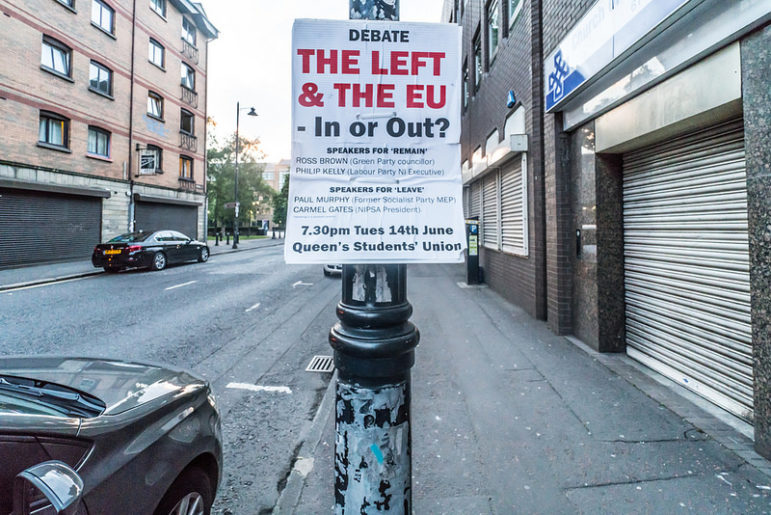
June 23, 2016; The New York Times
Britain has voted to leave the European Union. Prime Minister David Cameron is stepping down by October. Global markets are stunned, and the pound plunged to its lowest level since 1985. Uncertainty prevails. As was reported in the New York Times:
The “Leave” campaign won by 52 percent to 48 percent. More than 17.4 million people voted in the referendum on Thursday to sever ties with the European Union, and about 16.1 million to remain in the bloc.
What does this mean for the nonprofit sector in the UK and in the EU? No one knows. Any imagining leads immediately into a series of cul-de-sacs. The world’s political and economic maps are being redrawn.
Yesterday, NPQ concluded its review of the referendum with this warning: “Win or lose the Brexit vote, public institutions will continue to face ‘populist’ challenges until they become more accountable to ‘the people.’” The people voted.
The Wall Street Journal is offering live coverage of the financial markets and analysis on the UK’s referendum decision to leave the EU. The Guardian offered this interactive map of the voting and this live blog of the results.
Britain has voted by a substantial margin to leave the European Union. The picture that is emerging is of a heavily polarized country, with remain areas coming in more strongly for remain than expected, and leave areas more strongly for leave. Geographically, Scotland and London have voted overwhelmingly for remain, but outside the capital, every English region had a majority for leave.
UK’s leaders in international development submitted this letter, expressing their adamant view that the EU needs the UK and vice versa. “We now urge the huge numbers of people who support development work in the UK, locally and nationally, to give the EU’s role in international development the profile it needs as we campaign to remain in the EU.”
Sign up for our free newsletters
Subscribe to NPQ's newsletters to have our top stories delivered directly to your inbox.
By signing up, you agree to our privacy policy and terms of use, and to receive messages from NPQ and our partners.
Of particular concern to many is the impact this vote to leave the EU will have on the commitments made in Paris on mitigating climate change. Long before the vote, The Institute for European Environmental Policy (IEEP) published this 100-page paper together with the Wildlife Trusts, RSPB and WWF: “The potential policy and environmental consequences for the UK of a departure from the European Union.” (Ironically, epic flooding in London, perhaps as a result of climate change, may have stunted the voting.)
Writing such a paper itself was controversial, given the Charity Commission’s prohibition on EU campaigning. The Charity Commission ruled that NGOs could enter the referendum debate only “in exceptional circumstances,” stating that taking sides would “amount to political activity.” The Commission backed off from that strict position after NGOs protested the warning. The National Alliance of Women’s Organizations offered a clarification on what charities could and could not do.
That was then; this is now. The Economist’s “Brexit” interactive poll-tracker showed that the Scots, the young, the Labour and LibDem parties, and the rich were solidly in favor of remaining in the EU. The Conservative (Tory) and UKIP parties were for Brexit, as were, largely, Britain’s poor.
The British Treasury estimates that the British gross domestic product, representing the size of the economy, will fall by 3.5 percent, clobbering tax receipts; that half a million people will lose their jobs; and that housing prices (and thus personal wealth of homeowners) will fall by 10 percent.
The EU is the largest single donor of Official Development Aid (ODA), and within the EU, the UK is one of the few member states, as well as one of the largest, to meet the target of spending 0.7 percent of national GNI (Gross National Income) on foreign aid. The UK is also the second largest donor nation of the OECD (Organization for Economic Cooperation and Development).
Meanwhile, this contagion of upheaval seems to be spreading to the U.S. with the continuing breakdown in Washington’s ability to govern. Yesterday, the Supreme Court deadlocked on a major immigration case involving the limits of executive power when Congress fails to act, casting millions into limbo, and Democrats engaged in a 25-hour gun safety protest on the U.S. House floor.
What is in store for the civil sector in the UK, EU, and the U.S.? NPQ will continue to share what we learn with you as it happens.—James Schaffer












